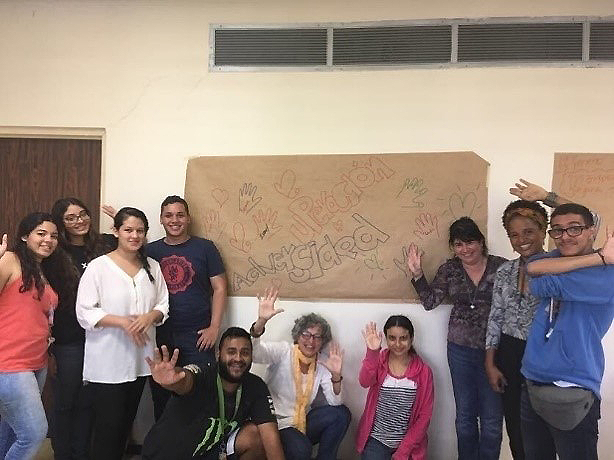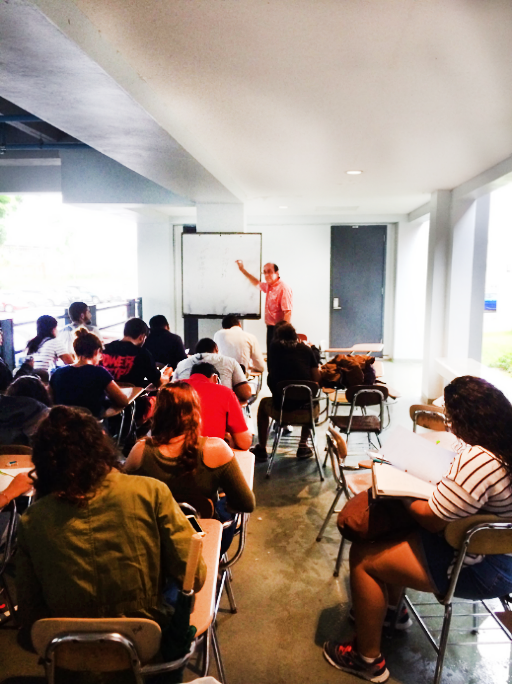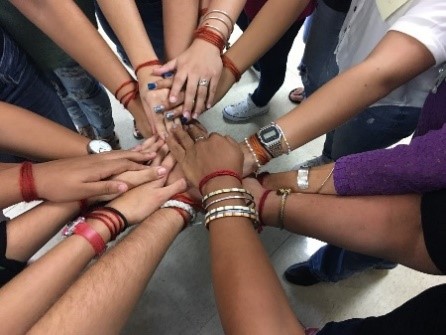“There’s knowledge to seize in Puerto Rico, and our program is letting students know that they have a really important role to play in solving local problems, that they are part of the solution,” says Isar P. Godreau, Ph.D., a researcher at the University of Puerto Rico (UPR) Cayey Institute of Interdisciplinary Research.
Dr. Godreau, along with fellow researchers Mariluz Franco-Ortiz, Ph.D., at UPR Cayey Institute of Interdisciplinary Research, and Raymond Louis Tremblay, Ph.D., at UPR Humacao, directs an NIGMS Innovative Programs to Enhance Research Training (IPERT) grant. The UPR IPERT supports undergraduates throughout the university’s 11 campuses.
Resources Reach Thousands
 Dr. Franco-Ortiz (second from right) with students during a Coaching for Resiliency workshop session. Credit: Ivonne Bayron-Huertas, Ph.D.
Dr. Franco-Ortiz (second from right) with students during a Coaching for Resiliency workshop session. Credit: Ivonne Bayron-Huertas, Ph.D.
Furthering NIGMS’ goals to create a highly skilled and diverse biomedical workforce, UPR IPERT provides undergraduate students from economically disadvantaged families with skills development and mentoring opportunities. One of the program’s main components is a series of Coaching for Resiliency workshops, which cover topics such as dealing with stress, managing family expectations, and handling financial challenges. A coach leads each group that includes about 10 to 15 first-year students and half as many second-year or higher students who act as peer mentors.
The coaching sessions help students connect with one another and with mentors. “One of the main accomplishments beyond the numbers is the power of networking,” says Dr. Franco-Ortiz. “The power of networking at different levels—from student mentors and faculty mentors at the UPR campus as well as abroad—is so crucial in terms of helping students who are looking for next steps.”
Stephanie Cameron-Maldonado, a fifth-year biology and psychology dual major at UPR Cayey, has participated in the coaching sessions as a student mentor. “It’s been a blast! I felt that I was giving back to other students who were starting their undergrad education,” she says. “The workshops have also helped me learn new strategies for managing my time and setting goals.”
UPR IPERT also supports interdisciplinary elective courses and workshops that help students learn how to work with data. These workshops are in high demand; the first one originally had 12 seats, and 77 students applied. In 2020, one of the elective courses focused on using mathematics to better understand epidemics and investigated the spread of COVID-19 in Puerto Rico. Local media outlets even featured students from the course and their work.
 Students can access free webinars from UPR IPERT on the CienciaPR website.
Students can access free webinars from UPR IPERT on the CienciaPR website.
In addition, UPR IPERT has created a free online learning community centered around a series of webinars that fill an important gap: They’re in Spanish, while most college-level science content is in English. They focus on Puerto Rican researchers and questions that are important to their communities. More than 2,000 students have registered to join this community through the CienciaPR portal. Students from Latin America and the United States have taken advantage of the program’s online offerings as well.
Support During Stress
 Dr. Tremblay teaching in a hallway after the UPR at Humacao campus was damaged by hurricanes in 2017. Credit: Raymond Louis Tremblay, Ph.D.
Dr. Tremblay teaching in a hallway after the UPR at Humacao campus was damaged by hurricanes in 2017. Credit: Raymond Louis Tremblay, Ph.D.
The work of UPR IPERT has taken on even greater importance during times of stress and uncertainty. For instance, Hurricanes Irma and Maria devastated Puerto Rico in September 2017. Many UPR students had to quit school temporarily to help their families cope with the situation or because they simply couldn’t reach campus due to a lack of infrastructure. UPR IPERT staff kept in touch with students through letters, calls, and emails—often while dealing with intermittent phone and internet service—and through in-person meetings.
When the Cayey campus reopened in November 2017, the staff resumed the Coaching for Resiliency workshops, which at that time served 55 students. Dr. Franco-Ortiz, who led the workshops along with the coaches, recalls that students said the workshops helped them feel supported and motivated in the wake of the hurricanes, with one calling the meetings an “oasis” amid challenging circumstances.
To provide support during another trying time—the COVID-19 pandemic—UPR IPERT has moved its resiliency and quantitative workshops online. The electives, like other courses at UPR, have been taught virtually. The program directors said that providing students with resources to handle stress and connect with others through the resiliency workshops felt crucial during such a trying public health crisis. More than 90 students have been involved in the resiliency workshops during the fall 2020 semester.
Looking to the Future
Within 4 years, UPR IPERT has helped increase first-year retention rates and graduation rates. Eighty-eight percent of students who graduated after participating in the resiliency workshops decided to pursue graduate studies. And 80 percent of those who applied to graduate programs were accepted to study subjects including clinical psychology, mathematics, clinical social work, microbiology, environmental toxicology, epidemiology, inorganic chemistry, and neuroscience.
 UPR IPERT emphasizes the importance of collaboration. Credit: Mariluz Franco-Ortiz, Ph.D.
UPR IPERT emphasizes the importance of collaboration. Credit: Mariluz Franco-Ortiz, Ph.D.
Frances M. Aponte-Caraballo, a fifth-year biology major and mathematics minor at UPR Cayey, has participated in the Coaching for Resiliency workshops, elective courses, and other opportunities offered by UPR IPERT. After she graduates in May 2021, Aponte-Caraballo plans to pursue a Ph.D. in epidemiology with a focus on infectious diseases. “UPR IPERT has given me the opportunity to increase my knowledge and to pursue what I want to do,” she says. “It has given me tools and support that enabled me to be part of the Research Training Initiative for Student Enhancement program, present at the Society for Advancement of Chicanos/Hispanics and Native Americans in Science conference, and participate in a summer internship offered by the American Institute of Mathematics. I have learned to believe in my capabilities and be better every day, enjoying what I do.”
Moving forward, the program directors hope to continue the workshops, electives, and webinars, and to help members of their community become even more connected. “We need to solve situations as a group. As individuals, we’ll never be knowledgeable about everything,” says Dr. Tremblay. “In the future, I want to see even more integration between the different IPERT components so that we build a community that is holistic in its perspective in solving biological problems.”
For more about IPERT, visit our program webpage.
UPR IPERT is supported by NIGMS grant R25GM121270.

